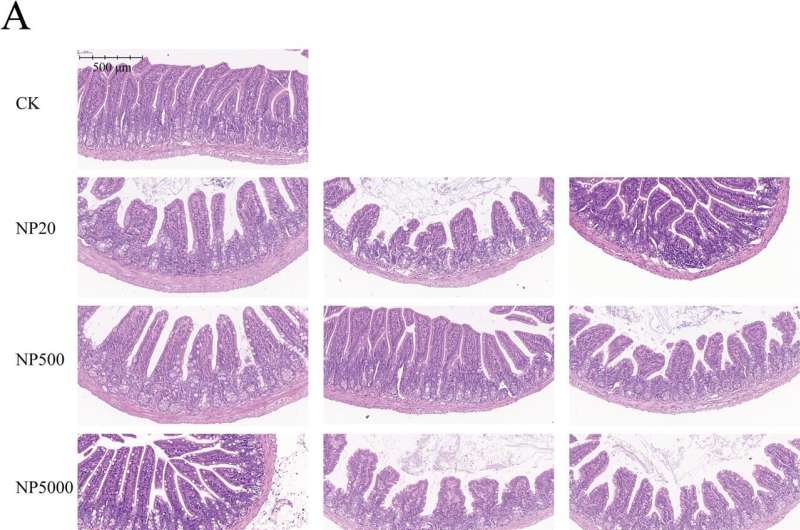This article has been reviewed according to Science X's editorial process and policies. Editors have highlighted the following attributes while ensuring the content's credibility:
fact-checked
peer-reviewed publication
trusted source
proofread
Plastic particles harm gut health and immunity in mice, study shows

Scientists have found that tiny plastic particles can accumulate in the intestines of mice and cause damage to their gut health and immune system.
The study, led by researchers from the Institute of Applied Ecology of the Chinese Academy of Sciences, published in the journal Environment International, exposed mice to polystyrene micro/nanoplastics (PS-MNPs) through oral gavage for 28 days. PS-MNPs are plastic fragments with diameters ranging from one nanometer to five millimeters, which can be released into the environment from the degradation of plastic waste.
The researchers found that the PS-MNPs could accumulate in the mouse intestines and significantly alter the composition and metabolism of the gut microbiota, the community of microorganisms that live in the digestive tract. This led to an increase of potentially harmful bacteria and a decrease of beneficial bacteria in the gut, which could increase the risk of infection.
The PS-MNPs also disrupted the function of the intestinal barrier, which is a layer of cells and mucus that protects the gut from harmful substances and pathogens. The PS-MNPs reduced the expression of proteins that maintain the tight junctions between the cells and the mucosal layer, leading to inflammation and tissue damage in the intestine.
In addition, the PS-MNPs inhibited the differentiation of T cells, a type of white blood cell that regulates the immune response. The PS-MNPs also reduced the secretion of immunoglobulin A, a type of antibody that protects the mucosal surfaces from pathogens.
The researchers also found that the effects and mechanisms of PS-MNPs on the mouse intestines depended on the particle size and the exposure time. Smaller particles and longer exposure time caused more severe damage and inflammation.
The study suggests that micro- and nanoplastics may pose a serious threat to human health, as humans and animals can easily ingest them through food and water. The researchers call for more research and regulations to prevent and reduce the environmental contamination and health risks of micro- and nanoplastics.
More information: Zhichun Zhang et al, Continuous oral exposure to micro- and nanoplastics induced gut microbiota dysbiosis, intestinal barrier and immune dysfunction in adult mice, Environment International (2023). DOI: 10.1016/j.envint.2023.108353





















